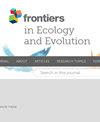A meal to ameliorate the Anthropocene
IF 2.4
3区 环境科学与生态学
Q2 ECOLOGY
引用次数: 0
Abstract
Despite (or perhaps because of) the staggering scale and pace of global change, the concept of the Anthropocene eludes discrete classification. There is widespread consensus that conditions associated with the Anthropocene, including rapid biodiversity loss and climate change, must be addressed if we are to enjoy ongoing and rich experiences. At the crux of human impacts is urban living – as of 2024 nearly 60% of people live in cities. Human societies are tightly interconnected with each other and surrounding ecosystems, but for city-dwellers, these connections may seem abstract. A failure to appreciate and foster such connections can have human and environmental health repercussions. We present a concept for a meal featuring local wild foods that could only be appropriately served under regionally ameliorated Anthropocene conditions. By presenting this hypothetical “solution”, we seek a common ground that spans human (and non-human) cultures and behaviors, and a concept that can be extended to any community. The simplicity of the “Anthropocene meal” belies three primary challenges: improvements to urban design, maintenance of ecosystem health, and shifting cultural attitudes. However, these barriers are quantifiable and may be addressed within annual to decadal timelines, making the Anthropocene meal a broadly achievable goal, and thus a valid source of optimism in a time of great uncertainty.改善人类世界的一餐
尽管(或许是因为)全球变化的规模和速度令人震惊,但人类世这一概念却无法分门别类。与 "人类世 "相关的条件,包括生物多样性的迅速丧失和气候变化,已经成为广泛共识,如果我们要享受持续而丰富的体验,就必须加以解决。人类影响的核心是城市生活--截至 2024 年,近 60% 的人生活在城市。人类社会相互之间以及与周围的生态系统紧密相连,但对于城市居民来说,这些联系似乎很抽象。如果不重视和促进这种联系,就会对人类和环境健康造成影响。我们提出了一种以当地野生食物为特色的餐点概念,这种餐点只有在人类世区域性改善的条件下才能适当供应。通过提出这种假设的 "解决方案",我们寻求一种跨越人类(和非人类)文化和行为的共同点,以及一种可扩展到任何社区的概念。人类世大餐 "的简单性掩盖了三个主要挑战:改善城市设计、维护生态系统健康和转变文化态度。然而,这些障碍都是可以量化的,并且可以在每年到十年的时间内得到解决,这使得 "人类世大餐 "成为一个可以广泛实现的目标,从而在一个充满不确定性的时代成为乐观主义的有效来源。
本文章由计算机程序翻译,如有差异,请以英文原文为准。
求助全文
约1分钟内获得全文
求助全文
来源期刊

Frontiers in Ecology and Evolution
Environmental Science-Ecology
CiteScore
4.00
自引率
6.70%
发文量
1143
审稿时长
12 weeks
期刊介绍:
Frontiers in Ecology and Evolution publishes rigorously peer-reviewed research across fundamental and applied sciences, to provide ecological and evolutionary insights into our natural and anthropogenic world, and how it should best be managed. Field Chief Editor Mark A. Elgar at the University of Melbourne is supported by an outstanding Editorial Board of international researchers. This multidisciplinary open-access journal is at the forefront of disseminating and communicating scientific knowledge and impactful discoveries to researchers, academics and the public worldwide.
Eminent biologist and theist Theodosius Dobzhansky’s astute observation that “Nothing in biology makes sense except in the light of evolution” has arguably even broader relevance now than when it was first penned in The American Biology Teacher in 1973. One could similarly argue that not much in evolution makes sense without recourse to ecological concepts: understanding diversity — from microbial adaptations to species assemblages — requires insights from both ecological and evolutionary disciplines. Nowadays, technological developments from other fields allow us to address unprecedented ecological and evolutionary questions of astonishing detail, impressive breadth and compelling inference.
The specialty sections of Frontiers in Ecology and Evolution will publish, under a single platform, contemporary, rigorous research, reviews, opinions, and commentaries that cover the spectrum of ecological and evolutionary inquiry, both fundamental and applied. Articles are peer-reviewed according to the Frontiers review guidelines, which evaluate manuscripts on objective editorial criteria. Through this unique, Frontiers platform for open-access publishing and research networking, Frontiers in Ecology and Evolution aims to provide colleagues and the broader community with ecological and evolutionary insights into our natural and anthropogenic world, and how it might best be managed.
 求助内容:
求助内容: 应助结果提醒方式:
应助结果提醒方式:


